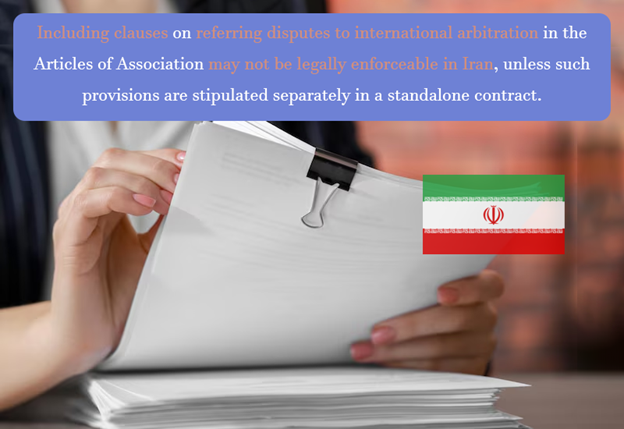Your Legal Roadmap to Starting a Joint-Stock Company in Iran; A Guide for Founders and Foreign Partners begins with understanding the legal and procedural steps required to successfully register a company — especially when foreign shareholders are involved. Whether you’re looking to establish a joint-stock company in Iran or expand your business into this dynamic market, having a strong grasp of the legal framework for Companies is crucial.
At LibraLaw Firm, we guide entrepreneurs through the complexities of Iranian corporate law. From capital requirements and board structures to fees, share classes and investor responsibilities, our legal experts will help you navigate the process with clarity and confidence. For more information on corporate law, refer to our detailed article «Corporate Law in Iran; Everything You Need to Know Before Starting a Business».
What Does the Minimum Capital Requirement Mean for Your Business in Iran?
The minimum capital required to establish a private joint-stock company in Iran is 1 million IRR, which is approximately equal to €1 (as of the publication date of this paper). While this amount may seem nominal, it carries significant legal implications: the registered capital defines the upper limit of shareholder liability; This means that shareholders are only liable for the company’s debts up to the value of their shares.

Before initiating the registration process, 35% of the declared capital must be deposited into a special bank account opened in the company’s name; This deposit serves as proof of financial commitment and acts as a regulatory safeguard. For example, if the declared capital is 1 billion IRR, at least 350 million IRR must be available in the company’s designated bank account.
The remaining 65% must be paid by the shareholders after registration, according to a timeline specified in the company’s statutes — typically within one year. In practice, legal advisors often recommend contributing a higher percentage upfront to expedite administrative processes and enhance credibility with potential partners or investors.
In summary, while the minimum capital requirement is modest, its implications for legal liability, regulatory compliance and corporate reputation are significant. Ensuring the transparent and timely deposit of capital is often the first indicator of seriousness for any founding group.
If you’re exploring different company structures for entering the Iranian market, our article «A Simple Guide to Entering the Iranian Market; Choosing the Right Legal Structure for Foreign Investment» provides a detailed comparison of capital requirements and liability across legal forms.
How Does Governance Work for Joint-Stock Companies in Iran?
Joint-stock companies are governed by a structured framework that prioritizes transparency and shareholder involvement. All joint-stock companies are required to convene an Annual General Meeting (AGM) of shareholders. During this meeting, key decisions — such as approving financial statements, distributing dividends, appointing directors and selecting inspectors — must be formally reviewed and approved.
The requirement for an annual audit depends primarily on the size and scope of the company’s business activities. However, even small companies can significantly enhance their credibility through a voluntary audit, particularly when interacting with banks, foreign partners or government agencies.

Who Can Conduct Statutory Audits?
In Iran, statutory audits are a crucial part of ensuring transparency, regulatory compliance and financial integrity for companies. To guarantee the quality and reliability of the audit process, it is essential that audits be conducted by firms that are official members of the Iranian Association of Certified Public Accountants (IACPA); This professional body sets the standards and guidelines for auditing practices in Iran, ensuring that audits meet the country’s legal and financial requirements.
Only firms that are designated as «official accountants» by the IACPA are authorized to conduct statutory audits; These firms have undergone rigorous vetting and are equipped with the necessary expertise to handle the complex auditing needs of businesses operating in Iran. By hiring IACPA-certified firms, companies can be assured that their audits will be conducted in accordance with national auditing standards, minimizing the risk of errors, fraud or misreporting.
Moreover, utilizing IACPA-certified audit firms helps establish credibility with stakeholders, such as investors, government authorities and international partners, who rely on accurate and transparent financial statements; This is particularly important for companies with foreign investors or those seeking to expand internationally, as a reliable audit can enhance the company’s reputation and ensure compliance with both local and global financial regulations.
Choosing the right audit firm is not just a legal requirement but also a strategic decision that can impact the company’s long-term success and ability to attract investors. Therefore, businesses should carefully select audit firms with a proven track record, appropriate credentials and the ability to meet their specific needs, ensuring a smooth and compliant audit process.
Why Is the Appointment of Inspectors Essential for Company Governance?
In addition to external audits, the Commercial Code requires the appointment of at least one inspector or «auditor-inspector» annually at the AGM; This inspector is responsible for monitoring the conduct of the directors, reviewing the company’s financial performance and reporting any findings to shareholders. For example, if the directors misuse company funds or engage in unauthorized transactions, the inspector is legally obligated to report this in writing before the next AGM.

In practice, many companies choose to appoint two inspectors — one primary and one substitute — to ensure continuity in case the primary inspector is unable to fulfill their duties; This arrangement not only strengthens internal controls, but also aligns the company with good governance practices that are expected by local regulators and international partners.
What Hidden Costs Should You Expect When Registering a Company in Iran?
Establishing a private joint-stock company in Iran involves relatively low and predictable costs, making it accessible to a wide range of entrepreneurs and investors. The registration fee is minimal and is calculated based on the amount of authorized capital declared during incorporation. This means that companies with higher capital may pay slightly more; but the base fees remain quite low compared to many other jurisdictions.
In addition to the registration fee, companies are subject to a stamp duty of 0.2% of the registered capital. For example, if the capital is 5 billion IRR, the stamp duty would amount to 10 million IRR; This duty must be paid to the Iranian Tax Administration at the time of incorporation and it is a one-time charge.
While these are the main mandatory government fees, it’s important to also consider additional expenses, such as:
- Notary public fees for authenticating documents;
- Legal advisory or consulting fees if using a third party for incorporation;
- Bank service charges for opening the capital deposit account;
- Publication costs for registering the company name and statutes in the Official Gazette.

Overall, while the base registration fees are relatively low, the practical setup costs can vary depending on the complexity of the company structure and the outsourced services. Entrepreneurs are advised to account for these additional expenses in their planning to avoid delays during the registration process.
In particular, foreign investors should be aware of how tax obligations can affect setup and operational costs. For more insights, refer to our detailed guide: «A Practical Guide to Iranian Tax Laws for Foreign Investors».
What Types of Shares Can You Issue in an Iranian Joint-Stock Company?
The Iranian Commercial Code allows the issuance of different classes of shares, providing flexibility for structuring ownership and voting rights; The two most common types are common shares (ordinary shares) and preference shares. Common shares typically carry standard voting rights and entitle the holder to a share of the profits (dividends) and remaining assets upon liquidation; These are the default type of shares unless otherwise specified.
Preference shares, on the other hand, can be structured to provide priority in dividend payments or repayment of capital. However, they usually come with limited or no voting rights. In practice, companies issue preference shares when raising capital from passive investors who seek guaranteed returns without involvement in management.
Shares can be issued in either registered or bearer form:
- Registered shares are issued in the name of a specific shareholder and require formal documentation for any transfer.
- Bearer shares, although still legally attributed to a shareholder, allow for easier and quicker transfer, often by simple endorsement or delivery. However, due to potential misuse and concerns about transparency, bearer shares are less commonly used in practice, and many companies opt for registered shares to meet compliance requirements.
Importantly, shares of joint-stock companies are freely transferable unless the articles of association specify otherwise; This means that any shareholder can sell their shares without needing prior approval from other shareholders or the board, unless a restriction is included in the company’s founding documents.
For example, in startup joint-stock companies with multiple investors, it is common to restrict transferability for a specific period (e.g., 2 years) to prevent early exits and maintain shareholder stability.

How Is a Board of Directors Structured in Iranian Joint-Stock Companies?
Every joint-stock company in Iran is legally required to have a board of directors, composed of either shareholders themselves or their legal representatives; This structure ensures that key decisions are made collectively and under proper internal governance. The law mandates the appointment of at least two directors, with no maximum number specified, allowing flexibility based on the company’s size and complexity.
The board of directors is elected for a fixed term of two years during the annual general meeting (AGM). However, re-election is permitted; meaning that directors can serve multiple consecutive terms if re-appointed. The AGM also has the authority to appoint the managing director (CEO), who may or may not be a member of the board. The managing director is responsible for overseeing daily operations and acts as the legal representative of the company before government authorities, banks and courts.
In cases where one or more directors reside outside of Iran, the company’s Articles of Association must explicitly authorize the delegation of power to resident directors; This ensures smooth decision-making and continuity in signing official documents, especially in companies with foreign shareholders or diaspora investors.
What Are the Practical Rules for Directors in Iranian Companies?
Many companies in Iran grant broad operational authority to the managing director to accelerate routine decision-making and improve efficiency. However, it is standard practice to outline specific limitations in the Articles of Association, clearly stating which actions require full board approval — such as the sale of fixed assets or securing major loans.
To ensure legal integrity and transparency, board resolutions must be formally recorded in meeting minutes and signed by all members present; This documentation serves as an additional legal safeguard in case of future disputes or audits.

For regulatory compliance, companies are required to report any changes in the composition of the board of directors or in their respective authorities to the Company Registration Office; These changes must also be published in the Official Gazette within a legally defined period, typically 30 days.
How Long Does It Take to Register a Joint-Stock Company in Iran?
The registration process for a joint-stock company in Iran generally takes 2 to 4 weeks, depending on the speed of document preparation and submission. After all necessary documents are submitted, the formal registration process takes around two weeks. However, if foreign shareholders are involved, additional time may be needed for document translation and notarization, which can add up to another two weeks.
To avoid delays, it’s crucial to have all documents properly prepared in advance. Factors such as the complexity of the company structure and whether additional approvals are needed can also influence the timeline. Early planning and the help of legal experts can help ensure a smooth and timely registration process.
What Documents Do Foreign Shareholders Need to Register a Company in Iran?
The process requires the submission of a detailed set of documents to the Deeds and Properties Registration Organisation of Iran. For foreign shareholders or joint ventures, the following are typically required:
- Articles of Association of the foreign company (translated into Persian and notarized);
- Certificate of incorporation or registration of the foreign company, including both the original and the Persian translation;
- Official notice of establishment in the foreign jurisdiction (translated);
- A private agreement between the Iranian and foreign parties regarding the formation of the new company. While this agreement must exist, it does not have to be submitted with the registration file, preserving confidentiality;

- Introduction of a representative on behalf of the foreign company to serve as a board member; but only if the foreign party wishes to actively participate in governance;
- A notarized and translated Power of Attorney (PoA) granting the representative full authority, including delegation rights, to act on the company’s behalf;
- The representative’s signature and the foreign company’s official stamp must appear on all key registration forms, including the application, minutes of the inaugural meeting and shareholder resolutions.
Key Practical Steps for Registering a Company with Foreign Involvement in Iran
- Translation & Verification: All foreign documents must be translated by an official translator and verified by the Iranian embassy or consulate in the country of origin.
- Prepare Persian Drafts: It’s advisable to prepare Persian drafts of key forms, such as Form A, Articles of Association and the shareholder list, before finalizing the agreement; This helps to avoid delays in the registration process.
- Appoint a Representative: Even if the foreign partner does not intend to actively manage the company, they must still formally appoint a representative to handle procedural tasks on behalf of the company.
- Use of Legal Advisors: The assistance of an Iranian legal advisor or company registration agent is highly recommended to ensure smooth communication with the Registrar and ensure compliance with local legal requirements.
- Post-Registration Requirements: After the registration is complete, the new company must be published in the Official Gazette and assigned a national ID number to officially begin operations.
These practical steps help ensure that the company registration process is efficient, legal and compliant with Iranian regulations.
What You Need to Know About Articles of Association for Joint-Stock Companies with Foreign Shareholders in Iran?
The Articles of Association (AoA) for a private joint-stock company in Iran that includes foreign shareholders are typically divided into two language sections: one in Persian and one in the foreign shareholder’s language, usually English. Legally, only the Persian version is binding and enforceable, while the English version serves purely for reference and internal clarity for the foreign party.

The Persian version must be signed by the Iranian shareholders and the foreign-language part must be signed by the foreign company’s authorized representative. It is crucial that both versions are aligned in content to avoid potential disputes, even though the Persian version governs. Any discrepancies between the two versions will be resolved in favor of the Persian version, as per Iranian law.
In practice, companies with foreign participation — especially when structured as private joint-stock companies — are commonly referred to as «joint venture companies», even though this is not a separate legal category under Iranian law; This informal term reflects the collaborative ownership structure rather than a distinct legal form.
What Are the Key Differences Between LLCs and Joint-Stock Companies in Iran?
In addition to joint-stock companies, Iranian law also allows businesses to be formed as Limited Liability Companies (LLCs). These are often preferred by smaller enterprises or those that do not require complex share structures. LLCs in Iran are similar to business forms in other countries, such as:
- French SARLs
- German GmbHs
- British private limited companies (Ltd.)
The key differences between LLCs and joint-stock companies lie in their liability, transferability of shares, governance and reporting obligations; For instance, LLCs generally offer simpler compliance requirements but come with more rigid rules regarding the transfer of ownership when compared to joint-stock companies.
This structure makes LLCs more suitable for businesses with fewer shareholders or those that prefer a simpler, more flexible framework; while joint-stock companies are better for larger ventures that may need complex share structures or intend to raise capital through the public or private sale of shares.
What Are the Best Practices for Incorporating a Company with Foreign Elements in Iran?
When incorporating a company with foreign shareholders or partners in Iran, it’s essential to follow a few best practices to ensure a smooth and legally compliant process:
- Simultaneously Prepare Both Language Versions: Ensure that both the Persian and foreign-language versions of key documents, such as the Articles of Association, are prepared at the same time; This helps prevent discrepancies and ensures both parties are aligned from the outset.

- Review by a Licensed Iranian Corporate Lawyer: Have the Persian version of the documents thoroughly reviewed by a licensed Iranian corporate lawyer; This step ensures compliance with local regulations and minimizes the risk of legal issues arising later.
- Ensure Full Signing Authority for the Foreign Representative: Make sure that the foreign representative has full signing authority, including the authority to sign the Articles of Association and other key documents; This is crucial for the legal validity of the incorporation process.
By following these best practices, you can streamline the incorporation process and avoid potential legal complications down the line.
Establishing a company in a foreign market can be a daunting and intricate process and having the right legal guidance is crucial to navigating these complexities successfully. Consulting with experienced legal professionals who specialize in this field is not just beneficial; it’s essential for ensuring a smooth and efficient process.
If you’re looking for expert assistance in establishing a joint-stock company in Iran, the legal specialists at Libralaw Law Firm are here to support you every step of the way. With in-depth knowledge and experience in Iranian corporate law, we are ready to help you navigate legal intricacies, avoid potential pitfalls and set your business up for success. Don’t hesitate to contact us for professional guidance tailored to your specific needs.









